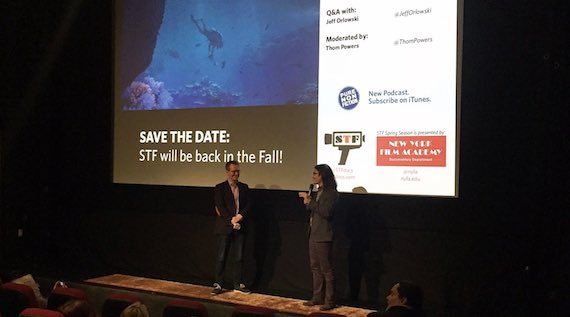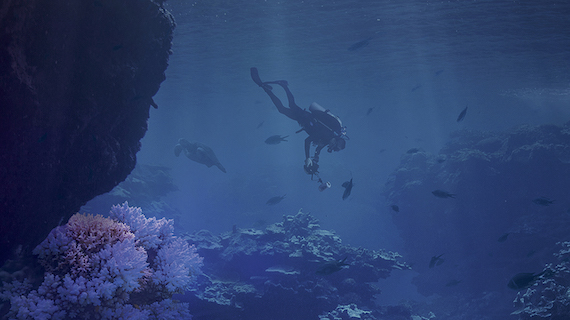
Writing and Videography by Joseph Schroeder, who has managed the production of highly acclaimed educational and informational programming for networks such as PBS, A&E and National Geographic for over a decade. Currently the Vice President of Production and Operations of The Independent Production Fund. Follow him on Twitter and see more of his work on his website.
Stranger Than Fiction closed its 2017 Spring Season with Jeff Orlowski’s latest film, Chasing Coral, a powerful reminder of humanity’s connection to each other and our ecosystem. Orlowski grew up in Staten Island and attended Stuyvesant High School in Manhattan, which is just over a mile from STF’s home, the IFC Center. The atmosphere was very much a “family screening,” as Orlowski noted in his opening remarks before the film.
This family spirit couldn’t have been more appropriate for Chasing Coral, which depicts the bleaching of coral reefs in magnificently stunning detail around the world, reminding us that humanity needs to work together to solve the problems presented by climate change. The film’s opening shot features a dive into the ocean, immediately introducing the audience to the majesty just below the surface. Richard Vevers, an advertising executive turned underwater photographer, shares that once he sets his eyes upon the reef, “everything slows down.” We soon learn, through Vevers and his team, that many of corals around the world are dying at alarming rates. He reveals that in the last 30 years, we’ve lost 50% of the world’s corals.
The film further details how this epidemic directly correlates to the temperature of the ocean. Dr. Ruth Gates explains that we ignore the ocean because, “We look at climate change as an issue in the air.” The science behind it is relatively simple – when the water is too warm, corals expel the algae living in their tissues, causing the coral to turn completely white, which is the bleaching oceanographers refer to. Gates adds, “it’s the same as if your body temperature is changing.” At various points in history, this increase in temperature has led to widespread bleaching across the earth’s oceans.
It’s this next bleaching event that Orlowski’s team, which includes Vevers and admitted “coral nerd” Zackery Rago, sets out to document. They aim to approach the dying coral the same way James Balog approached disappearing glaciers in Orlowski’s first film, Chasing Ice – through time lapse video and photography. This meant the team had to once again set up cameras around the world in extreme conditions. In this case, the majority of the cameras are stationed at various points of the Great Barrier Reef, considered by the team to be “the Manhattan of the ocean.” But soon the cameras fail, and the crew is forced into daily dives to capture the time lapse imagery themselves of the dying coral. It takes a toll, particularly on Rago, who remarks “I thought we’d see bleaching, but I never thought we’d see this.”
Orlowski shed light on that experience in the Q&A, sharing that though the team was saddened by documenting the death of the coral reefs, they’re hopeful for the future. “I find optimism from a couple of areas… there’s been such denial for such a long time, but in this ironic way, the planet is suffering so much right now… it’s becoming completely unignorable, you can’t deny it anymore. It’s getting to this phase where it’s just beyond denial.” He continued, “I’m actually very optimistic that we will solve this problem. It is a matter of when, and it’s a matter of how much human suffering there will be between now and then. But at a certain point, we will realize it.”
The main goal of Chasing Coral is to aid in that realization, through capturing these images and communicating them. In the Q&A, Orlowski asked, “What happens when a billion people who depend on corals for their food and protein – what happens when they lose their main source of protein? This issue is going to dominate this century. This is the biggest issue humanity has ever had to deal with.” Richard Vevers states it even more emphatically near the end of the film. “Us losing the Great Barrier Reef has got to wake up the world.”
Chasing Coral will indeed get that opportunity on July 14th when it becomes available on Netflix to audiences around the world. Orlowski noted in the Q&A that while he’s hopeful people will watch, he’s even more hopeful that organizations and individuals will host screenings. More information for those who want to do so is available at www.chasingcoral.com. Discussion guides and other materials will be made available to both educate and engage regarding what will indeed be one of the most important issues of the next decade.
Related Film






